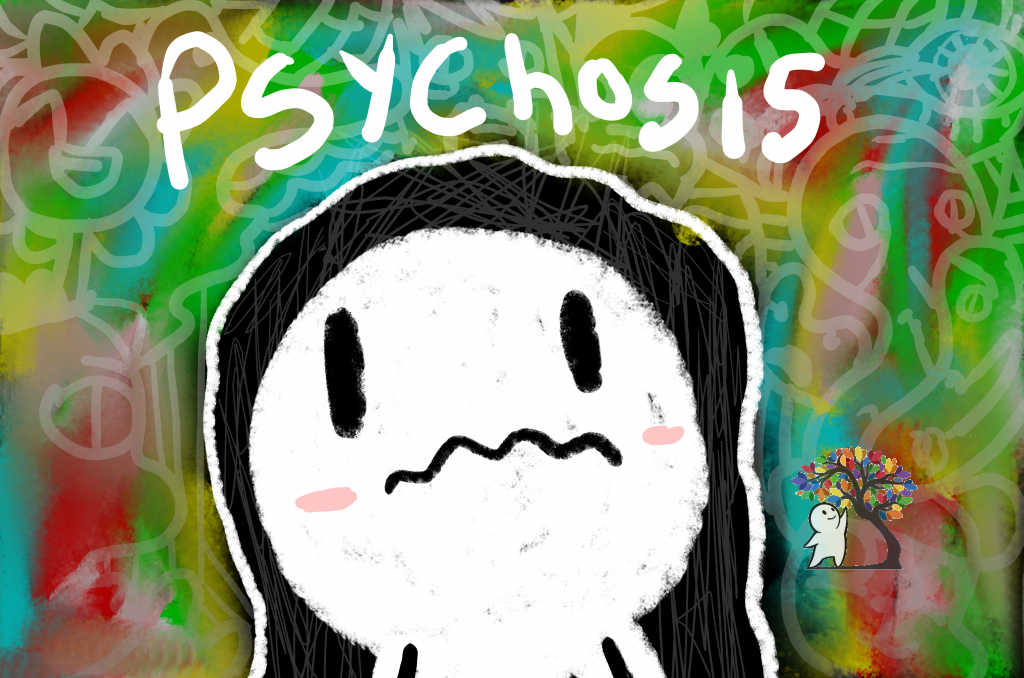8 Signs of a Psychotic Break

Hi there Psych2goers, this is a disclaimer that this article is for informative purposes only. It is not intended to serve as mental health advice. Please do not self-diagnose and reach out to a doctor, or mental health professional if you’re struggling.
Psychiatric problems are heavily stigmatized and psychosis is no exception. We can all think of a movie with a “psychotic” killer terrorizing the town. In the news, we hear of people who have committed a heinous act described as “psychotic.” This label is even used to describe people in our everyday lives who act differently. While it’s true that there are some cases that a serial killer may be experiencing psychosis, this is a very short-sighted view on the condition. Psychosis is incredibly complex and affects everyone differently and to varying degrees. To help better understand this condition, in this article, we’ll be focusing on psychotic episodes, known as breaks.

Firstly, What Is Psychosis?
Psychosis is a disruption in someone’s perception of reality; they have a difficulty telling what is real and what isn’t. It usually is a symptom of another condition, thus is not considered a disorder itself (NAMI 2020). Commonly it is found in psychotic disorders such as schizophrenia, schizoaffective disorder, and delusion disorder among many others. In rare occasions, it may show up in cases of severe depression and bipolar disorder. In other cases, it can happen in tandem with drug abuse to periods of intense stress. It affects people in their functioning, behavior, and thinking in significant ways, therefore seeking treatment early on is ideal (PsychGuides 2020).
A psychotic break is an episode of psychosis and may be recurring, or one-off depending on the situation. As many as 3% of the population may experience at least one episode in their lifetime. These episodes do not happen overnight as the signs can gradually build up, months to years prior to the episode itself (NAMI 2020).
Now that we’ve briefly discussed what psychosis is, here are eight signs of a psychotic break. Please note that everyone experiences psychosis differently. Some may experience all the signs, others may have few, and others may have some that are not listed, or experience these signs in different ways than described.

1. Withdrawal
Generally, when a person is experiencing a psychotic break, or starting to develop one, they’re more withdrawn. These people aren’t socializing as much as they used to and they aren’t as engaged. This can happen for a multitude of reasons: perhaps the affected person is suspicious of the others around them. Maybe they’re dealing with a delusion and focus all their time and energy with coping. Perhaps they just aren’t motivated to do the things they used to. Withdrawal is an early symptom of psychosis and can come on unexpectedly and seem out of character to those surrounding the affected person (Miller 2020).

2. Neglecting Self-Care
Someone experiencing psychosis may have difficulties functioning which can lead to neglecting self-care. Things like hygiene may go out the window. Additionally, school and work performance can drop drastically. The person experiencing psychosis may try to adopt a simplified and rigid routine to help maintain some sort of function, but struggles to adapt when things change and complicate (Cedar Clinic 2020).

3. Hallucinations
People with psychosis may experience any kind of hallucination. Perhaps they see shapes and shadows in the corner of their eye. Maybe it’s hearing voices in the distance that aren’t really there. In other cases they may feel odd sensations or taste things that no one else can. Hallucinations can range from subtle to more prominent. In some cases as well, they may be anything from ordinary, seeing bugs that don’t exist for example, to something completely unrealistic, such as creatures (NAMI 2020).

4. Distrusting others
Psychosis can cause someone to distrust those around them, even if they’re close family. In some cases they might feel that people are lying to them, or that no one else is real. They’re often highly skeptical of others and opt to keep their social circle at a minimum. In some cases they may have a select few that they do trust, and can go overboard in the way they trust others. Maybe a person thinks that their family is trying to hurt them so they confide in a friend that they trust, and with this friend, they believe everything they say (Cedar Clinic 2020).

5. Increase In Anxiety and Depression
Dealing with psychosis can bring on a lot of problems. Delusions and hallucinations can be overwhelming and exhausting. While delusions and paranoia is one thing, excessive isolation is another. Someone may be on edge a lot of the time and feel alone in their struggles. They can also become increasingly more angry and irritable as well as increasingly pessimistic. They also can feel alone and unable to express their struggles. (Brogaard 2016).

6. Emotional difficulties
With psychosis, someone may find themselves under or overreacting to situations. They can at times experience anhedonia and not feel pleasure in any activity. On the contrary, they may feel intense emotions that may be inappropriate to the given scenario. For instance, they may lash out in rage to a seemingly small inconvenience, especially if under the influence of alcohol. (Brogaard 2016).

7. Strange beliefs
A person with psychosis may adopt false beliefs known as delusions. They may also partake in magical thinking (belief that their thoughts influence the world). Some delusions can be intense and overwhelming, such as believing that someone is plotting to murder you, or perhaps you believe that the TV is sending you secret messages. With magical thinking, a less direct delusion, you may believe that you can prevent events, such as catching an illness, simply by thinking about it. These beliefs usually go beyond what is culturally and socially accepted norms, appearing odd or bizarre to others. People experiencing these can be firm in their delusions and refuse to accept contrary evidence (NAMI 2020).

8. Suspiciousness
Someone experiencing psychosis may become highly suspicious of others and their surroundings. While distrusting others is a factor of this, they may be suspicious of their surroundings in general. Perhaps they think that they’re being monitored by the government or that someone is following them – despite no real rationale as to why either of these would be transpiring. They’re constantly aware that something fishy is happening and in turn, can cause difficulties in other areas (Cedar Clinic 2020).

Psychosis is a scary and isolating condition to experience. Unfortunately it has a lot of stigma attached to it that blows certain aspects out of proportion. It is important to know that it affects everyone differently and to different levels. Importantly, it can be treated and getting the proper help can tremendously improve the affected person’s condition. What do you think about psychosis? Have you experienced any of the signs yourself? Let us know in the comments.
References:
- Brogaard, B. (2016, October 25). 10 Subtle Signs of Psychosis. Psychology Today. www.psychologytoday.com/us/blog/the-superhuman-mind/201610/10-subtle-signs-psychosis
- Cedar Clinic. (2020). Early Signs of Psychosis. Center for Early Detection, Assesment, and Response. www.cedarclinic.org/index.php/understanding-early-psychosis/early-signs-of-psychosis
- DiSalvo, D., & Essig, T. (2012, August 13). What Really is a “Psychotic Break with Reality”?Forbes. www.forbes.com/sites/daviddisalvo/2012/08/10/what-really-is-a-psychotic-break-with-reality/#631e9c1f6e34
- Miller, C. (2020). Early Treatment for Schizophrenia Improves Outcomes. Child Mind Institute. childmind.org/article/first-episode-psychosis-early-treatment-critical/
- National Alliance on Mental Illness. (2020). Early Psychosis and Psychosis | NAMI: National Alliance on Mental Illness. www.nami.org/About-Mental-Illness/Mental-Health-Conditions/Psychosis
- PsychGuides. (2020). Psychotic Disorders. PsychGuides.Com. www.psychguides.com/psychotic-disorders/
- Tanap, R. (2017, March 20). Understanding Psychotic Breaks | NAMI: National Alliance on Mental Illness. National Alliance on Mental Health. www.nami.org/Blogs/NAMI-Blog/March-2017/Understanding-Psychotic-Breaks
Like this article? Here’s another you may enjoy:



Responses